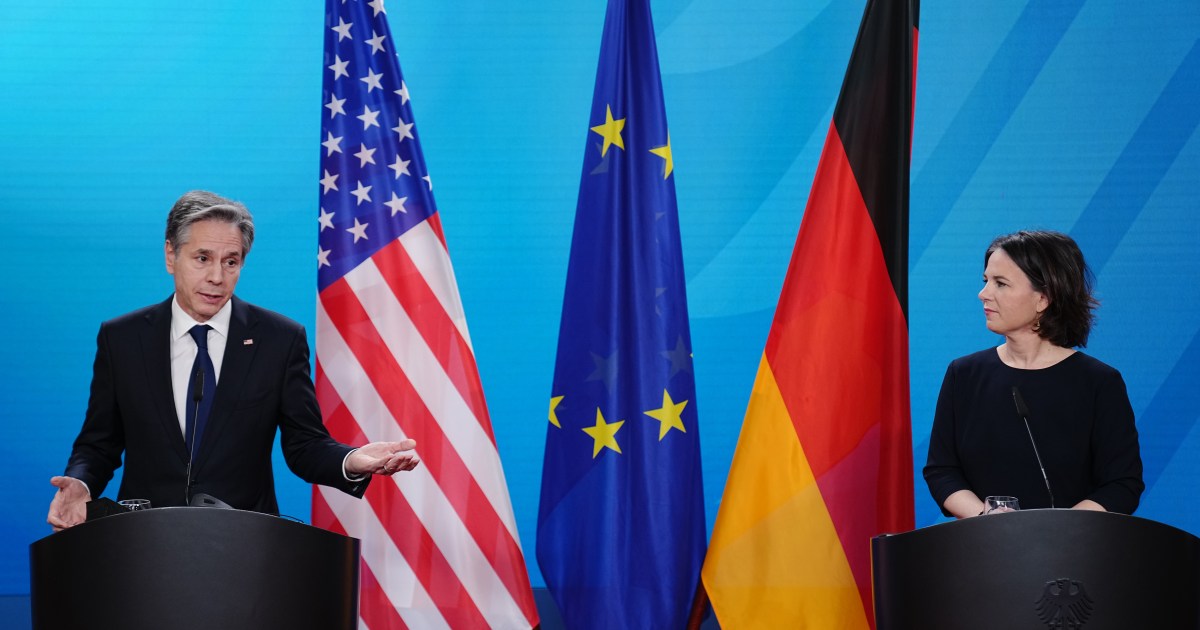US Secretary of State Anthony Blinken said today, Thursday, that negotiations to revive the Iranian nuclear agreement have made modest progress and have reached a decisive stage, while German Foreign Minister Annalina Birbock accused Iran of undermining the negotiations by "operating the spiral of nuclear escalation."
"There is a real urgency, and it is now a matter of weeks, to determine whether or not we can return to joint compliance with the 2015 nuclear deal," Blinken told a joint press conference in Berlin with his German counterpart.
However, the US Secretary of State warned that it would be necessary to take a different path with Tehran if progress was not made, and "My assessment is that a return to mutual compliance is still possible," Blinken said after talks with his European counterparts.
The United States unilaterally withdrew from the 2015 agreement in 2018, during the administration of former President Donald Trump, and re-imposed severe sanctions on Tehran, which prompted Iran to gradually withdraw from many of its commitments in the nuclear agreement.
nuclear escalation
On the other hand, the German Foreign Minister said that time is running out for the Vienna negotiations, "because Iran is working - unfortunately - in conjunction with the talks to trigger the spiral of nuclear escalation."
Minister Birbock pointed out that Iran has reached 60% of uranium enrichment, which "is an unprecedented rate for a country that does not possess nuclear weapons, and there is no reasonable explanation for this, and Iran has also not provided a reasonable explanation for this."
The German minister added that the goal is still to preserve the nuclear agreement and stop uranium enrichment, "and the negotiations in Vienna did not enter a decisive stage, but rather entered the decisive stage."
French Foreign Minister Jean-Yves Le Drian said today, Thursday, that the negotiations held in Geneva between the major powers and Iran cannot "go so slowly", which will make the revival of the nuclear agreement impossible.
In press statements, Minister Le Drian described the progress made in the nuclear negotiations as "partial, timid and slow," while pointing out that there is an "urgent need to change the pace, otherwise the end of the JCPOA will be inevitable."
The "Joint Comprehensive Plan of Action" is the official name for the Iran nuclear deal.
change of approach
In a related context, a French diplomatic source said today, Thursday, that progress in the negotiations to revive the nuclear agreement did not include the core issues in the negotiations, adding that the approach should be changed before the crucial month of February.
On the other hand, Iran said a few days ago that a large part of the points of contention had been resolved in the Vienna nuclear negotiations, and that the meetings would resume on Monday, focusing on the abolition of sanctions against Tehran.
Iranian Foreign Ministry spokesman Saeed Khatibzadeh said that a large part of the points of contention were resolved in the current round of negotiations, considering that "the outstanding issues are important, and their solution requires a political decision by Washington."
He added that there is procrastination from the West in lifting the embargo and sanctions, and he also held the US government responsible for its policies and the consequences of its repudiation of its commitments in the nuclear agreement and harm to Iran, as he put it.
It should be noted that the nuclear agreement is concluded between Iran and 6 major powers: the United States, France, Britain, Russia, China and Germany, and was described as a historic agreement after years of tension, hard negotiations and sanctions against Tehran.
The agreement made it possible to lift many of the sanctions that were imposed on Iran, in exchange for limiting its nuclear activities and ensuring the peace of its program.

